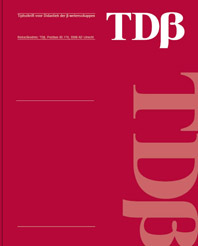Hoe begrijpen en gebruiken docenten van de schoolvakken natuurkunde, scheikunde en economie het wiskundige concept ‘afgeleide’

Tijdschrift voor Didactiek van de Beta-wetenschappen, uitgegeven door het Freudenthal Instituut, Universiteit Utrecht in de periode 1983-2014 |
Vos, P. Den Braber, N. Roorda, G. Goedhart, M. Tijdschrift voor Didactiek van de Beta-wetenschappen |
ow do teachers of physics, chemistry and economics understand the mathematical concept ‘derivative’.
Mathematical concepts are used in non-mathematical lessons, such as physics, chemistry and economics; consequently, these lessons are also a learning environment for mathematics. To characterize this environment, and to contribute to discussions on coherent education, we carried out an exploratory study on the knowledge and usage of mathematical concepts among teachers of physics, chemistry and economics. The study focused on the concept derivative, which is used for velocity and acceleration in physics, for reaction speed in chemistry, and for marginal costs in economics. For teacher knowledge with respect to the derivative we discerned Content Knowledge and Pedagogical Content Knowledge (Shulman, 1986). We interviewed and assessed ten teachers on their knowledge and their methods of explaining the derivative in the classroom. It turned out that mathematical knowledge had dwindled and was perceived as useless for classroom practice, and that the repertoire of solution methods for mathematics problems was limited. The teachers did not approach the mathematical concept as an abstraction, but looked for concrete signification. In classroom practice they avoided mathematical backgrounds, techniques and relationships, and they kept their explanations linked to situations. We observed little alignment between mathematics and the affiliated sciences, both in conventions of terminology and symbol usage, and between curricula and explanation methods. There was one exception: a physics teacher, who simultaneously taught mathematics, explicitly connected subjects in the classroom. Therefore, we recommend more interdisciplinary professional development, both for CK and for PCK, as a basis for a better alignment between subjects.
U moet ingelogd zijn om een reactie te kunnen plaatsen.


